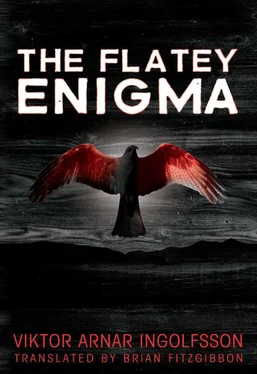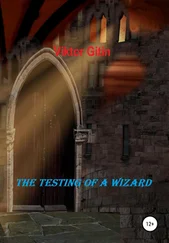Viktor Ingolfsson - The Flatey Enigma
Здесь есть возможность читать онлайн «Viktor Ingolfsson - The Flatey Enigma» весь текст электронной книги совершенно бесплатно (целиком полную версию без сокращений). В некоторых случаях можно слушать аудио, скачать через торрент в формате fb2 и присутствует краткое содержание. Жанр: Триллер, на английском языке. Описание произведения, (предисловие) а так же отзывы посетителей доступны на портале библиотеки ЛибКат.
- Название:The Flatey Enigma
- Автор:
- Жанр:
- Год:неизвестен
- ISBN:нет данных
- Рейтинг книги:5 / 5. Голосов: 1
-
Избранное:Добавить в избранное
- Отзывы:
-
Ваша оценка:
- 100
- 1
- 2
- 3
- 4
- 5
The Flatey Enigma: краткое содержание, описание и аннотация
Предлагаем к чтению аннотацию, описание, краткое содержание или предисловие (зависит от того, что написал сам автор книги «The Flatey Enigma»). Если вы не нашли необходимую информацию о книге — напишите в комментариях, мы постараемся отыскать её.
The Flatey Enigma — читать онлайн бесплатно полную книгу (весь текст) целиком
Ниже представлен текст книги, разбитый по страницам. Система сохранения места последней прочитанной страницы, позволяет с удобством читать онлайн бесплатно книгу «The Flatey Enigma», без необходимости каждый раз заново искать на чём Вы остановились. Поставьте закладку, и сможете в любой момент перейти на страницу, на которой закончили чтение.
Интервал:
Закладка:
A black darkness looms over the land, but the sailing carries on the distant trail to death’s cold shores.
The most valiant asks: Why?
A potent spell dictates our journey,
And we are rowing for our lives,
Futile to seek any answers,
In battle we must place our trust.
Heavy gray clouds of eerie pelting hail,
Demanding the magic words,
The world under a skull storing thoughts for the winter.
The bottom two lines were in a different handwriting than the other lines of the poem and were followed by these words: This may be how the poet wanted it to end.
Below it there was a bizarre drawing that had been executed with a rough pencil. Probably the magic rune that Hallbjorg had referred to, Kjartan thought to himself.
On the next sheet there were some kind of questions, forty in total, written in beautiful and perfectly legible handwriting:
1. It will come near when it is God’s wish. 1 ^st letter.
2. Most impudent. 1 ^st letter.
3. The bad choice he made for me. 2 ^nd letter.
Kjartan dug into his pocket and fished out the answers Professor Lund had given to the priest and compared the questions.
1. Dangerous shot-D
2. Sarcastic Halli-S
3. Mother-O
Kjartan felt no closer. The questions seemed odd, and the answers said nothing to him. The fortieth and last question read as follows: Who spoke the wisest? Following that there were three rows of letters.
O S L E O Y I A R N R Y L
E M H O N E A E N W T L B
A U R M L E Q W T R O N E
Kjartan took out the note that Johanna had found in Gaston Lund’s pocket and which the priest had recognized. He examined the rows of letters written on its back and compared them with the three rows of letters written on the question sheet.
Professor Gaston Lund had clearly entered this library after he had said good-bye to the priest, and jotted down the key. And that was something he was forbidden to do and that would bring a curse on him, according to local belief. And he surely had been greatly cursed. The thought of it gave Kjartan a slight shudder. He refused to believe in curses of this kind, but there was no denying that it was very sinister nonetheless.
A note below the three rows explained that the thirty-nine correct answers should follow the same order as the thirty-nine letters in the answer to the fortieth question, and that this was how the poem should end.
Kjartan shoved the sheets back into the book. He stared at length at the note that had been found on the body, and then he decided that it was best to store that inside the manuscript as well. It was probably best to go along with the belief that the clues should be kept in the library and nowhere else. He wouldn’t feel comfortable walking around with it in his pocket, now that he realized what it was. He left the book as he had found it. Then, after locking the drawer, he pensively stepped out into the sunshine.
What was it that had compelled Gaston Lund to come to the library and write down that key before going to the ship? Had he been so desperate to solve the riddle that he deliberately broke the strict ancient rules of the game? How had he gotten into the locked building?
Question six: Who could not hold back their tears? First letter. They dragged up the body, and King Sverrir said it was the body of King Magnus. They slid a shield under the body and lifted it onto the ship and rowed to land. The body was still recognizable because its complexion had not changed; it still had rosy cheeks and rigor mortis had not set in. Before the body was veiled with a shroud, the king allowed Magnus’s men to file past it to identify it and bear witness. They filed past the body, and almost no one could hold back their tears. The answer is “Magnus’s men,” and the first letter is m.
CHAPTER 23
Thormodur Krakur stood watch on the flagpole stand in front of the church for two hours around lunchtime and finally rushed down to the village to ceremoniously announce that the mail boat was now visible on the southern horizon. Some men walked toward the shore, dragging two handcarts and preceded by a flock of running children.
Benny in Radagerdi put down his paintbrush when he became aware of the gathering crowd and sauntered after them out of sheer habit, even though he had no errand there. Life was so drab for a young man on this island that even the weekly arrival of the mail boat was something of an event. Maybe he’d know some of the passengers, and there was also always the hope of some workers from the south who might be on their way to the inner isles.
By the time the kids came charging around the corner by the fish factory, the mail boat had reached the tip of the island. It was an old white oak boat that was heavy and sluggish, although the skipper managed to maneuver it with surprising agility toward the pier. Valdi caught the hawser that was thrown to him over the gunwale and looped it around the bollard. Then the boat was tied at the back. Little Nonni followed his father every step of the way and paid no heed to the other children on the pier.
Two young boys in their Sunday best stood by the gunwale of the mail boat and were soon lifted onto the edge of the pier and followed by a brown suitcase crisscrossed with strings. A woman welcomed them, enveloping them both in a simultaneous embrace and calling them her darling little sweethearts. Three sacks of mail were then hoisted off the boat and placed on one of the carts, followed by four crates of malt ale and two sacks of flour that went into the other cart. This seemed to be the sum total of the delivery from this trip. The load that needed to be sent south to Stykkisholmur would only be loaded on board when the boat was making its return journey later in the day.
The men on the boat were preparing to depart again when the weary face of a tall man in a dirty light trench coat with a brown peaked cap appeared out of the forecastle and stiffly stepped onto the deck. He held a heavy case and scanned the pier with his eyes.
“Young man,” he shouted hoarsely at Benny, who was standing by the gunwale. “Would you grab this for me?” he asked, handing him the case. “But carefully now, carefully, I’ve got some fragile objects in there,” he added as Benny stretched out to take the case. The man clambered onto the edge of the pier, but then wobbled a bit and grabbed Benny’s arm for support.
“Bloody dizziness,” he said. “I think I must have just dozed off on the way. The journey seemed endless.” He looked toward the land and squinted his eyes at the fish factory on the embankment. “So this is the famous ancient island of Flatey in Breidafjordur. Is this it in all its glory then?”
“You can’t see the village from here,” Benny answered apologetically. “That’s on the other side of the island. That’s where all the houses are.”
“Is that right, my friend? What’s your name?”
“Benny…Ben.”
“Benny Ben. I see. My name is Bryngeir, a poet and writer, even though I’m temporarily hacking for a Reykjavik rag.”
“Just Ben…or Benny,” Benny swiftly corrected him. He was almost on the point of giving up on the name that he’d decided to adopt after reading a book about Ben Hur over one whole night two weeks ago.
“Put the case down really gently, Benny Ben pal,” said Bryngeir. “I have to check on its delicate contents.”
There was a rattle of glass from the case as it knocked against the pier. Bryngeir crouched over it, unzipped it, and pulled out a half bottle of rum. He unscrewed the top, poured drink into it, and knocked it back. Then he had another swig, this time straight from the spout, and straightened up, propping himself up against the lamppost on the pier.
Benny tried to guess Bryngeir’s age. His face looked rugged and gaunt, but something seemed to suggest that he wasn’t quite as old as he first seemed. He was probably forty. His dark hair had started to gray and recede. But one of his eyebrows was as white as snow, as were his eyelashes on the other side.
Читать дальшеИнтервал:
Закладка:
Похожие книги на «The Flatey Enigma»
Представляем Вашему вниманию похожие книги на «The Flatey Enigma» списком для выбора. Мы отобрали схожую по названию и смыслу литературу в надежде предоставить читателям больше вариантов отыскать новые, интересные, ещё непрочитанные произведения.
Обсуждение, отзывы о книге «The Flatey Enigma» и просто собственные мнения читателей. Оставьте ваши комментарии, напишите, что Вы думаете о произведении, его смысле или главных героях. Укажите что конкретно понравилось, а что нет, и почему Вы так считаете.











